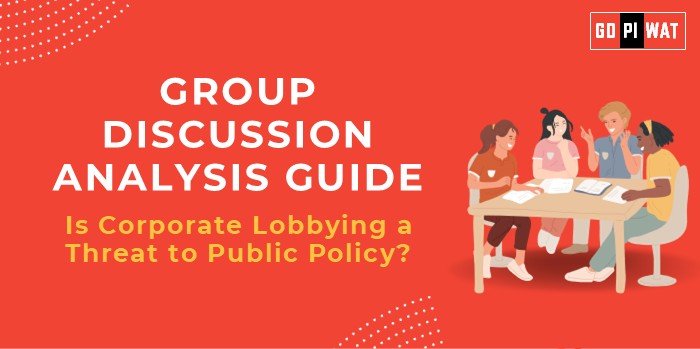📋 Group Discussion Analysis Guide: Is Corporate Lobbying a Threat to Public Policy?
🌐 Introduction to the Topic
- 📌 Opening Context: Corporate lobbying involves businesses influencing policymakers to enact legislation favorable to their interests. While it can lead to informed policymaking, concerns arise when such influence undermines public welfare.
- 📌 Background: Lobbying has been integral to democratic processes, allowing stakeholders to present their perspectives. However, the lack of transparency and potential for disproportionate influence by corporations have sparked debates about its impact on public policy.
📊 Quick Facts and Key Statistics
- 💰 Global Lobbying Expenditure: In the United States, lobbying spending reached approximately $3.5 billion in 2023, highlighting the significant resources dedicated to influencing policy decisions.
- 🇮🇳 India’s Lobbying Landscape: Corporate lobbying in India is estimated to involve substantial sums, reflecting its growing prevalence in policymaking despite limited transparency.
- 📉 Transparency International Corruption Perceptions Index 2023: India ranked 85th out of 180 countries, indicating challenges in governance and the potential risks of unregulated lobbying.
- 🌍 OECD Report: Only 22% of countries have comprehensive regulations governing lobbying activities, underscoring the global need for enhanced transparency and accountability.
- 🏭 Case Example: The Vedanta Sterlite plant controversy in Tamil Nadu highlighted allegations of corporate lobbying influencing environmental clearances, leading to public protests and the plant’s eventual closure.
🤝 Stakeholders and Their Roles
- 🏢 Corporations: Advocate for policies aligned with business interests, such as favorable regulations or tax incentives.
- 🏛️ Government Bodies: Balance corporate interests with public welfare while developing and implementing policies.
- 🌍 Civil Society Organizations: Act as watchdogs, advocating for transparency and accountability in lobbying practices to ensure public interests are upheld.
- 📰 Media: Investigate and report lobbying activities, informing the public and holding entities accountable.
- 📑 International Organizations: Promote ethical lobbying practices and provide guidelines to ensure constructive influence on governance.
🏆 Achievements and ⚠️ Challenges
Achievements
- 💡 Policy Innovation: Lobbying introduces specialized knowledge and expertise into policymaking, leading to more informed legislation.
- 📈 Economic Growth: Advocacy for business-friendly policies can stimulate investment, job creation, and economic development.
- 🌍 Global Examples:
- 🇺🇸 United States: Development of the Renewable Fuel Standard influenced by the biofuels industry promoted alternative energy sources.
- 🇪🇺 European Union: Tech companies lobbied for regulations supporting innovation while ensuring data protection.
Challenges
- ⚖️ Regulatory Capture: Excessive corporate influence can lead to policies favoring specific industries at the expense of public interest.
- 🔍 Opaque Practices: Lack of transparency in lobbying activities can erode public trust in governance.
- 🌐 Global Comparisons:
- 🇸🇪 Scandinavian Countries: Stringent lobbying regulations result in higher transparency and public trust.
- 🇮🇳 India: Faces challenges due to limited regulation and disclosure requirements for lobbying activities.
📖 Structured Arguments for Discussion
- Supporting Stance: “Corporate lobbying facilitates informed policymaking by providing legislators with industry-specific insights and expertise.”
- Opposing Stance: “Unregulated corporate lobbying poses a threat to public policy by allowing private interests to overshadow the common good.”
- Balanced Perspective: “While corporate lobbying can contribute valuable information to the legislative process, it requires stringent regulations to prevent undue influence and ensure alignment with public interest.”
🗣️ Effective Discussion Approaches
- 📊 Opening Approaches:
- “The closure of the Vedanta Sterlite plant in Tamil Nadu underscores the contentious nature of corporate lobbying and its impact on public policy.”
- “With global lobbying expenditures reaching billions, it’s imperative to examine whether such influence serves or undermines public interest.”
- 📌 Counter-Argument Handling:
- Example: “While proponents argue that lobbying introduces necessary expertise into policymaking, the lack of transparency and potential for regulatory capture necessitate robust oversight mechanisms.”
📈 Strategic Analysis of Strengths and Weaknesses
SWOT Analysis
- Strengths:
- Provides specialized knowledge to policymakers.
- Can lead to economic policies that foster growth.
- Facilitates stakeholder engagement in governance.
- Weaknesses:
- Potential for disproportionate influence by wealthy corporations.
- Risk of policies that favor private interests over public welfare.
- Lack of transparency can erode public trust.
- Opportunities:
- Implementing transparent lobbying regulations.
- Encouraging ethical lobbying practices.
- Enhancing public awareness and media scrutiny.
- Threats:
- Corruption and unethical lobbying practices.
- Public backlash against perceived corporate overreach.
- Potential for policy decisions that exacerbate inequality.
🎓 Connecting with B-School Applications
- 🌍 Real-World Applications:
- Analyzing the role of corporate lobbying in shaping economic policies.
- Developing frameworks for ethical lobbying practices in emerging markets.
- 📚 Sample Interview Questions:
- “Discuss the ethical implications of corporate lobbying in public policy.”
- “How can businesses balance advocacy with social responsibility in their lobbying efforts?”
- 💡 Insights for Students:
- Explore the impact of lobbying on regulatory environments in various industries.
- Consider the role of transparency and ethics in corporate governance and public relations.


